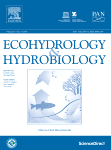
ECOHYDROLOGY & HYDROBIOLOGY
Scope & Guideline
Advancing the science of water and life.
Introduction
Aims and Scopes
- Ecohydrology:
The journal emphasizes the integration of ecological and hydrological principles, exploring how water dynamics influence ecosystem functions and biodiversity. - Water Quality Assessment:
Research on the impacts of various pollutants, including pharmaceuticals and microplastics, on aquatic ecosystems is a core focus, highlighting methods for monitoring and improving water quality. - Climate Change Impacts:
The journal frequently addresses the effects of climate change on hydrological variables and ecosystem responses, providing insights into adaptation and mitigation strategies. - Innovative Methodologies:
A strong emphasis is placed on the development and application of novel methodologies, such as remote sensing, machine learning, and hydrobiogeochemical modeling, to enhance understanding of ecohydrological processes. - Biodiversity and Conservation:
Research articles often focus on aquatic biodiversity, including macroinvertebrates, fish, and microbial communities, along with conservation strategies for preserving these resources. - Sustainable Water Management:
The journal promotes studies on sustainable practices in water resource management, including nature-based solutions, to support ecosystem health and resilience.
Trending and Emerging
- Ecotoxicology and Pollution Monitoring:
There is an increasing focus on the assessment of pollutants, such as pharmaceuticals and microplastics, and their ecological impacts, reflecting growing concerns about environmental health. - Machine Learning and Data Science Applications:
The use of advanced computational techniques, including machine learning for ecological modeling and data analysis, is gaining traction, showcasing innovative approaches to understanding complex ecohydrological interactions. - Nature-Based Solutions for Climate Resilience:
Research on integrating natural processes into water management strategies is emerging as a significant theme, emphasizing the role of ecosystems in enhancing resilience to climate change. - Microbial Ecology in Ecosystem Health:
The study of microbial communities and their roles in ecosystem functioning and health is becoming increasingly prominent, highlighting the importance of microorganisms in nutrient cycling and pollution mitigation. - Hydrological Responses to Land Use Changes:
Emerging studies are focusing on the effects of land use and land cover changes on hydrological dynamics, emphasizing the need for integrated management practices that consider both ecological and hydrological factors.
Declining or Waning
- Traditional Water Management Techniques:
Research focused solely on conventional water management practices is decreasing, as there is a growing emphasis on innovative, sustainable, and nature-based solutions. - Overly Generalized Biodiversity Studies:
Studies that do not employ specific methodologies or detailed assessments of biodiversity in aquatic systems are becoming less common, as more rigorous approaches are favored. - Single-Factor Studies:
There is a noticeable decline in research that examines isolated environmental factors without considering their interconnectedness within the broader ecohydrological framework. - Historical Case Studies:
Research that primarily emphasizes historical data without integrating contemporary ecological and hydrological challenges is becoming less prevalent, as the focus shifts to current and predictive analyses.
Similar Journals

International Journal of Limnology
Elevating Understanding of Freshwater BiodiversityThe International Journal of Limnology, published by EDP SCIENCES S A, is a cutting-edge journal dedicated to the field of aquatic sciences, with a strong emphasis on limnology—the study of inland waters. Headquartered in France, the journal serves as a vital resource for scholars and practitioners alike, aiming to advance the understanding of freshwater ecosystems and their management. With an e-ISSN of 2823-1465 and classified within the Q3 category of the 2023 Aquatic Science quartiles, it occupies a significant niche in academic research, ranking 150 out of 247 in Scopus listings. The journal’s open access policy ensures that research findings are widely disseminated, facilitating collaboration and innovation across global aquatic science communities. Published continuously from 2022 to 2024, the International Journal of Limnology aspires to contribute to sustainable practices and enhance ecological understanding, making it an essential publication for researchers, professionals, and students committed to the stewardship of aquatic resources.
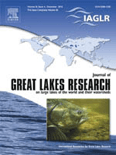
JOURNAL OF GREAT LAKES RESEARCH
Elevating Aquatic Research for Global ImpactJOURNAL OF GREAT LAKES RESEARCH is a prestigious academic journal published by Elsevier Science Ltd, focused on the vital field of aquatic sciences and ecology. With a long-standing history since its inception in 1975, this journal proudly ranks in the Q1 quartile across multiple categories, including Aquatic Science and Ecology, as of 2023, reflecting its significant contribution to the scientific community. The journal's impact is underscored by its impressive Scopus rankings, placing it within the top percentile of scholarly publications in related disciplines. Although it operates under a subscription model, its influence extends globally, serving as a critical resource for researchers and professionals dedicated to understanding the Great Lakes ecosystem and its broader ecological implications. As it converges into its future publications through 2024, JOURNAL OF GREAT LAKES RESEARCH remains an essential platform for innovative research that shapes environmental policy and promotes sustainable practices in aquatic environments.

Inland Water Biology
Illuminating Freshwater Interactions and BiodiversityInland Water Biology is a distinguished peer-reviewed journal published by MAIK NAUKA/INTERPERIODICA/SPRINGER, focusing on the intricate interactions within freshwater ecosystems. With its ISSN (1995-0829) and E-ISSN (1995-0837), this journal has established itself as an essential resource for researchers and professionals in the fields of Aquatic Science and Ecology, evidenced by its consistent ranking in the Q3 category for both disciplines in 2023. Covering a wide array of topics related to the biology of inland waters, the journal aims to disseminate cutting-edge research findings and theoretical advancements that contribute to the understanding of aquatic environments and their ecological significance. Although it does not offer open access, its impact in the academic community is noteworthy, ensuring that published works undergo rigorous peer review. Researchers, professionals, and students alike will find valuable insights and innovative approaches within its pages, making Inland Water Biology a vital addition to their academic endeavors.

JOURNAL OF THE AMERICAN WATER RESOURCES ASSOCIATION
Fostering collaboration for sustainable water resource solutions.The JOURNAL OF THE AMERICAN WATER RESOURCES ASSOCIATION, published by Wiley, is a premier platform dedicated to advancing the field of water resource management and research. With an ISSN of 1093-474X and an impressive Q1 ranking in multiple categories, including Earth-Surface Processes, Ecology, and Water Science and Technology, this journal serves as a vital resource for professionals, researchers, and students alike. Established in 1967 and set to converge through 2024, it has consistently published cutting-edge research that influences policy and practice in water resource management. The journal's open access option enhances its reach, ensuring that critical findings are accessible to a wider audience. The Scopus rankings further underscore its impact, placing it in the top quartile within its fields, highlighting its importance in shaping scholarly discourse. As a significant contributor to the understanding and management of freshwater systems, the journal offers a crucial means for sharing insights and fostering collaboration in the vital realm of water resources.
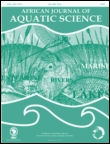
AFRICAN JOURNAL OF AQUATIC SCIENCE
Innovating solutions for freshwater and marine challenges.AFRICAN JOURNAL OF AQUATIC SCIENCE, published by TAYLOR & FRANCIS LTD, is a premier scholarly journal dedicated to the field of aquatic science, ecology, and environmental management, playing a crucial role in advancing research and knowledge in these vital areas. With an impressive Q2 ranking in both Aquatic Science and Ecology, Evolution, Behavior and Systematics, the journal seeks to publish high-quality research encompassing a wide range of topics related to freshwater and marine ecosystems, including biodiversity, conservation strategies, and the impacts of climate change. Featuring a rich history of publication from 2000 to 2024, the journal not only embraces rigorous peer review but also aims to foster collaboration and dialogue among researchers, practitioners, and students interested in aquatic environments. Readers will find that the journal’s commitment to impactful scientific communication is reflected in its notable rankings within the Scopus database, making it an essential resource for those engaged in aquatic research and management.

Journal of Oceanology and Limnology
Connecting Scholars in Oceanography and LimnologyJournal of Oceanology and Limnology, published by SCIENCE PRESS, is a premier academic journal dedicated to advancing the fields of oceanography and limnology. With an ISSN of 2096-5508 and E-ISSN 2523-3521, this journal has emerged as a vital resource since its inception, aiming to disseminate cutting-edge research and comprehensive studies on aquatic environments. Based in China and indexed with notable rankings in Scopus, including a Q2 category in Oceanography and a Q3 category in Water Science and Technology, this journal significantly contributes to knowledge in these crucial scientific disciplines. The H-index for the journal is currently being established, reflecting its evolving impact within the academic community. Moreover, the open access model promotes wider dissemination, ensuring that research findings are accessible to a global audience. Covering a diverse range of topics from ecosystem health to climate impact on water bodies, the Journal of Oceanology and Limnology aspires to foster interdisciplinary dialogue and innovation among researchers, professionals, and students engaged in understanding and preserving aquatic life.
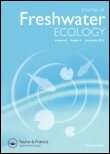
JOURNAL OF FRESHWATER ECOLOGY
Unveiling the mysteries of freshwater biodiversity.JOURNAL OF FRESHWATER ECOLOGY, published by Taylor & Francis Inc, is an esteemed source of research dedicated to advancing the understanding of freshwater ecosystems. Established in 1981, this Open Access journal has provided a platform for innovative studies and groundbreaking articles relevant to the fields of Aquatic Science and Ecology. With its HIndex reflecting a commitment to quality scholarship, the journal is currently classified in the Q3 category for both Aquatic Science and Ecology, Evolution, Behavior and Systematics, indicating its respectable impact within these disciplines. The journal ranks within the 45th percentile in Ecology and the 41st percentile in Aquatic Science on Scopus, highlighting its relevance to a global audience of researchers and practitioners. By facilitating unrestricted access to research findings since 2017, JOURNAL OF FRESHWATER ECOLOGY aims to enrich our understanding of freshwater systems and their conservation, making it an essential resource for those invested in ecological research and environmental sustainability.
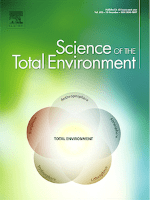
Science of The Total Environment
Innovative Research for Global Environmental ChallengesScience of The Total Environment, an esteemed journal published by Elsevier, holds a significant position in the field of environmental science, encompassing critical areas such as Environmental Chemistry, Environmental Engineering, Pollution, and Waste Management and Disposal. With an impressive impact factor and ranked in the Q1 quartile across its categories for 2023, the journal is recognized for its high-quality research output and contribution to environmental sustainability. Operating from its base in the Netherlands, the journal has been a valuable resource since its inception in 1972, welcoming innovative studies that address complex environmental challenges. Its notable rankings—such as Rank #9 in both Environmental Sciences and Pollution—underscore its relevance and influence in the academic community. Although the journal currently does not provide an open access option, the robust findings and discussions presented within its pages continue to foster a deeper understanding of environmental issues. Science of The Total Environment is an essential platform for researchers, professionals, and students dedicated to advancing knowledge and solutions in the rapidly evolving field of environmental science.
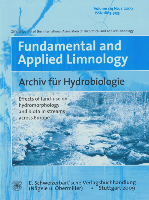
Fundamental and Applied Limnology
Discovering Biodiversity: Essential Insights for Ecological ProgressFundamental and Applied Limnology is an esteemed academic journal dedicated to the exploration of freshwater ecosystems, bridging the gap between fundamental research and practical applications. Published by E Schweizerbart'sche Verlagsbuchhandlung in Germany, this journal has been a vital resource in the fields of aquatic science and ecology since its inception in 2007. With its ISSN 1863-9135 and E-ISSN 1863-9135, it provides a platform for researchers to disseminate significant findings related to limnology, contributing to a rich understanding of freshwater biodiversity, water quality, and ecological interactions. Although currently rated in the Q3 quartile for aquatic sciences and ecology as per the 2023 rankings, it remains a valuable outlet for interdisciplinary research and practical insights, facilitating critical advancements in environmental management. Open access options enhance its visibility and accessibility, making it indispensable for researchers, professionals, and students alike who are committed to advancing the scholarship in freshwater studies. Engaging with this journal not only opens doors to the latest research findings but also fosters collaboration and innovation in the ecological community.
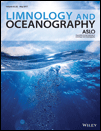
LIMNOLOGY AND OCEANOGRAPHY
Bridging the Gap Between Theory and Practice in Aquatic ScienceLimnology and Oceanography is a premier peer-reviewed journal published by Wiley that has been at the forefront of aquatic sciences since its inception in 1956. With an impressive impact factor placing it in Q1 in both Aquatic Science and Oceanography categories, this journal showcases cutting-edge research and studies relevant to the dynamics of freshwater and marine ecosystems. Limnology and Oceanography serves as a vital platform for researchers, professionals, and students to disseminate their findings and foster a deeper understanding of aquatic environments. The journal does not currently offer open access, but it provides a unique opportunity for scholars to contribute to a body of work that influences policy, conservation efforts, and the scientific community at large. With its substantial ranking in Scopus as #12 in Aquatic Science and #9 in Oceanography, Limnology and Oceanography remains a critical resource for advancing knowledge in these vital fields.